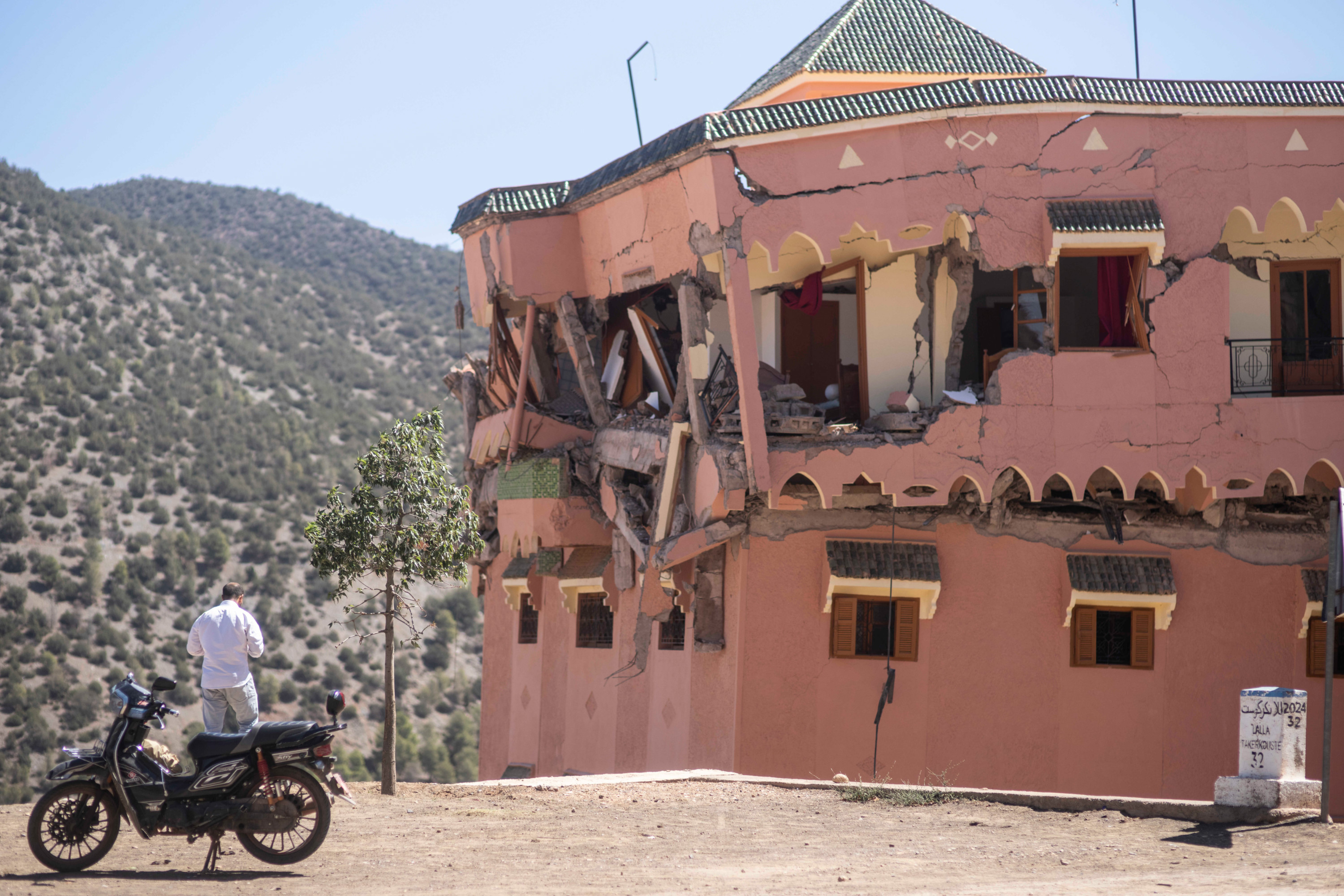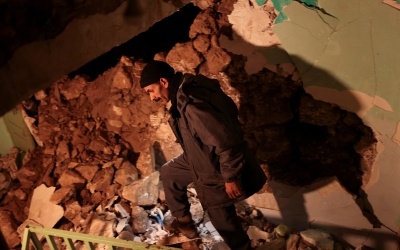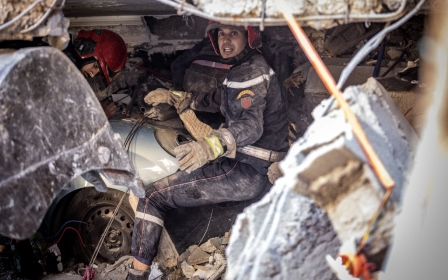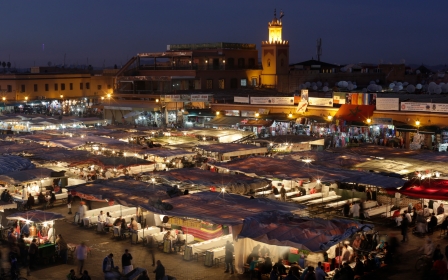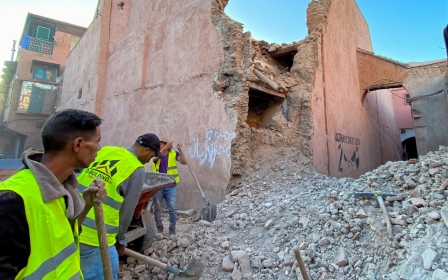Morocco earthquake survivors sleep outdoors as officials accused of slow response
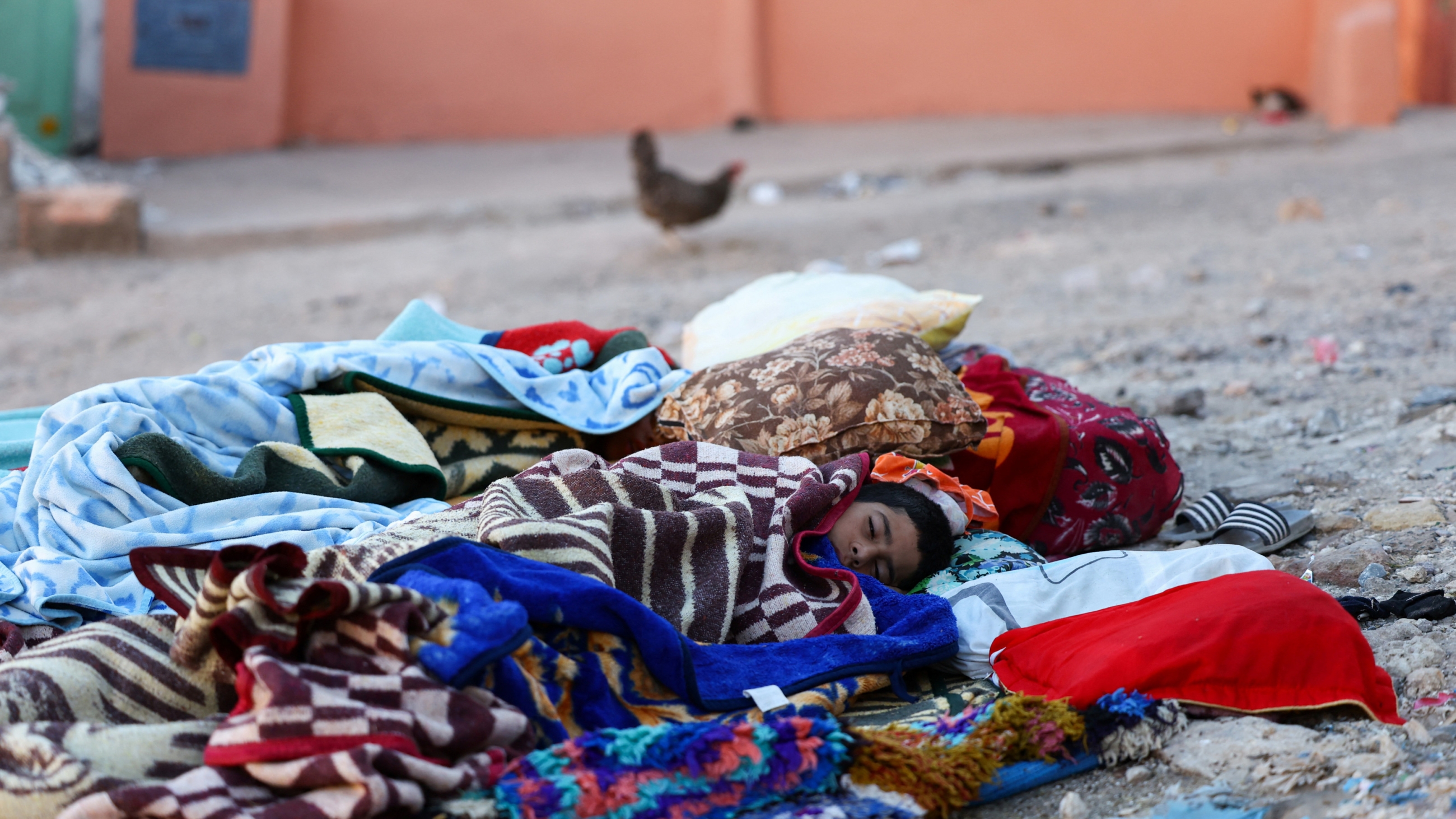
At a McDonald's in the uptown neighbourhood of Gueliz in Marrakech, verses from the Quran have replaced the Moroccan pop that is usually played.
Twenty-four hours after the violent earthquake that shook the province of Al Haouz, 400km southwest of the capital Rabat, Marrakech is a city without a soul.
On Saturday night, the city beloved of tourists, some 70km away from the epicentre, was in mourning.
Many locals chose to spend a second night in a row under the stars, for fear of aftershocks or simply because they have nowhere to go. On several major roads and green spaces of the city, dozens of people lay on the grass, some alone and others with their families.
In the southeast of the city, in the Sidi Youssef Ben Ali neighbourhood, Bilal still does not dare to return home.
Stay informed with MEE's newsletters
Sign up to get the latest alerts, insights and analysis, starting with Turkey Unpacked
"I'm still traumatised by what I experienced yesterday. I'd rather stay here with my wife and six-year-old son than risk death because of a collapsing roof," he told Middle East Eye before recounting what he lived the night before.
"It lasted more than 20 or 25 seconds. The dishes in the kitchen woke us up. At first, I heard the glasses break as they fell. But very quickly, I felt the whole house moving in all directions."
'A two-speed country'
Youssef, 32, still can't believe that an earthquake took place in southern Morocco, an area not prone to such devastating tremors.
"I didn't feel the earth shaking but the screams in the street woke me up. When I looked out the window, the first thing I saw was very thick dust. I realised later that it was the top of the minaret of the neighbourhood mosque that had collapsed," he told MEE.
"We're not used to that. I never imagined that the earth would shake in Marrakech. I thought it could only happen in northern Morocco," he said, referring to the 2004 Al Hoceima earthquake on the northern coast.
With a magnitude of 6.3 on the Richter scale, the seism nearly two decades ago killed 628 people and caused huge material damage.
'For now, there is no way we're sleeping at home'
- Najat, resident of Marrakech Old City
On Saturday, seismographs showed a magnitude of 6.8 - the most powerful earthquake ever measured in Morocco - and just hours after the first tremor, the toll is already much heavier than in 2004.
The tremor was also felt in Rabat, Casablanca, Agadir and Essaouira, where many panicked residents took to the streets in the middle of the night, fearing their homes would collapse.
According to the latest figures provided by the Ministry of the Interior, at least 2,012 people lost their lives - more than half of them (1,293) in Al Haouz province - and 2,059 injured have been recorded. Of these, 1,404 are in serious condition, according to the same source.
Marrakech was largely spared, but the douars - tiny Amazigh villages sitting on the High Atlas Mountains - were the most severely affected areas.
On social networks, relatives of the inhabitants of these battered villages say some municipalities have been completely wiped off the map. Others say they have not heard from their families for more than 24 hours because of power and telecommunications cuts.
"This shows that Morocco is a two-speed country. On the one hand, big cities benefit from most of the development," Salaheddine, a student in Rabat from Azilal province, told MEE.
"On the other hand, there are mountainous regions, which are known to be isolated and 100 years behind, and where there is no need for an earthquake for them to be cut off from the world.
"Sometimes it only takes a few drops of rain for the poor roads that link them to civilisation to be cut off for several days," he added.
The figures are sharp and clear: the provinces most affected by this earthquake - Al Haouz, Chichaoua and Azilal - are among the 15 poorest provinces of the kingdom out of 75, according to the 2014 general census of the population.
"In the douar where I teach, help only arrived in the morning," Mourad, a teacher reached by phone, told MEE.
"Those who were rescued were pulled out of the rubble by villagers. A colleague who teaches in the village of Tajgalte [in Taroudant province, south of Marrakech] says all her students died," he added.
This teacher, Zeyneb, shared on her Facebook page a video of her town, claiming that she escaped death "miraculously".
An absent government
Beyond the tragedy, some Moroccans have questioned the lack of comment and slow response from officials, particularly from Prime Minister Aziz Akhannouch, who by Saturday night had still not addressed Moroccans.
King Mohammed VI himself did not release any statement until late Saturday after returning from a private stay in France. He gathered several members of the government and chaired a meeting about the earthquake response.
He decreed a three-day national mourning with half-mast flags on all public buildings and instructed the government to set up an inter-ministerial commission to deploy an emergency programme to help rebuild homes destroyed by the earthquake.
'No message of support to the families of the victims, no announcement from him. What should we deduce from this?'
- Journalist on the king's response
"After that, he disappeared," a member of a WhatsApp group containing Moroccan journalists said in a message seen by MEE.
"It is appalling. On its official channels and social networks, its PR team has done little more than publish the statement of the royal cabinet. No message of support to the families of the victims, no announcement from him. What should we deduce from this?" the person added in the message.
In the Mellah, the former Jewish quarter of the Old City, desolation can be seen on the faces of the inhabitants of this vulnerable district.
The Mellah was rehabilitated in 2014 as part of the conservation programme of the Old City of Marrakech, a Unesco World Heritage Site since 1985.
But for Najat, a resident of the neighbourhood, there are one too many cracks in her home to feel safe.
"Our house hasn't collapsed but there are cracks everywhere. It's too dangerous. I don't know how long I'm going to stay here, but for now, there is no way we're sleeping at home," she told MEE.
"I'm still shaking, I thought it was the end of the world. Less than 200 metres from my house, the walls collapsed and there were deaths."
This article is an edited translation of a story that was originally published by Middle East Eye's French website.
Middle East Eye delivers independent and unrivalled coverage and analysis of the Middle East, North Africa and beyond. To learn more about republishing this content and the associated fees, please fill out this form. More about MEE can be found here.


